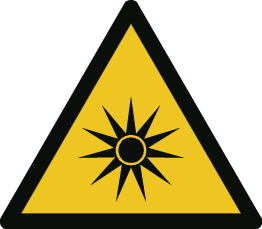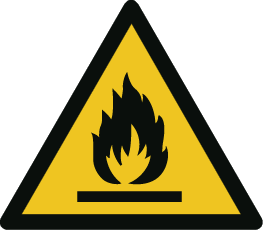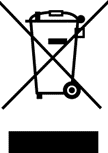Safety instructions
Operate the device only in a faultless and safe condition.
Modifications and extensions to the device are only permitted if the prior written consent of Chromasens GmbH is obtained.
Comply with the ambient conditions described in this manual.
During operation do not touch the hot surface of the device.
During operation do not look into the light.
Do not remove warning signs form the device.
Keep away from liquids.
Use the original packaging for transportation.
Safety instructions on optical radiation
Intense light sources can have the following effects to the human body:
Temporary reduction in visual acuity
Visual impairment
Afterimages
Irritation
Annoyance
Leading to accidents
Follow the safety instructions:
Do not look into the light beam.
Check the device before every use.
Wear opaque eye protection.
Optical radiation risk classes
The LEDs in the Corona II are divided into risk classes according to the risk assessment system CIE S009/E:2002 (DIN EN 62471).
The classification is done at full power operation. At lower current rates, the risk class might be lower.
Dark field
LED | Reflector type | |||
|---|---|---|---|---|
Top light A | Top light B | Top light C | Top light D | |
White | Class 2 “Medium risk” | Class 2 “Medium risk” | Class 1 “Low risk” | Class 1 “Low risk” |
Red, green | Class 1 “Low risk” | Class 1 “Low risk” | Class 1 “Low risk” | Class 1 “Low risk” |
Blue, IR 850 nm / 940 nm | Class 2 “Medium risk” | Class 2 “Medium risk” | Class 2 “Medium risk” | Class 2 “Medium risk” |
UV 365 nm / 395 nm | Class 3 “High risk” | Class 3 “High risk” | Class 3 “High risk” | Class 3 “High risk” |
SWIR 1100 nm / 1550 nm | Class 1 “Low risk” | Class 1 “Low risk” | Class 1 “Low risk” | Class 1 “Low risk” |
Bright field
LED | Reflector type Bright field H |
|---|---|
White, red, green | Class 1 “Low risk” |
Blue, IR 850 nm / 940 nm | Class 2 “Medium risk” |
UV 365 nm / 395 nm | – |
SWIR 1100 nm / 1550 nm | – |
Tube light
LED | Reflector type Tube light T, U |
|---|---|
White, red, green | Class 1 “Low risk” |
Blue, IR 850 nm / 940 nm | Class 2 “Medium risk” |
UV 365 nm / 395 nm | – |
SWIR 1100 nm / 1550 nm | – |
Safety instructions on thermal risks
The operating temperature of the device might be 75 °C. Hot surfaces can cause skin burns.
Follow the safety instructions:
Install additionally housings or covers to prevent skin burns.
Always switch off the device before carrying out any work on it.
Meaning of the signal words, safety signs and graphical symbols
Signal words
The following signal words are used in this manual:
| Signal word | Meaning, consequences if not prevented |
|---|---|
| DANGER | Warns of an imminent hazardous situation which results in death or serious injury. |
| WARNING | Warns of a potential hazardous situation, which could result in death or serious injury. |
| CAUTION | Warns of a potential hazardous situation, which could result in minor or moderate injury. |
| NOTICE | Warns of a hazardous situation, which can result in material damage or environmental damage. |
Safety signs and graphical symbols
The following safety signs and graphical symbols are used:
Sign | Meaning | |
|---|---|---|
 | Warning of dangerous electrical voltage | |
 | Warning of optical radiation | |
 | Warning of flammable material | |
 | Warning of falling items | |
 | Warning of hot surface | |
 | Warning of potential damage to the device | |
 | Indicates that electrical and electronic equipment should not be disposed with normal garbage at the end of its working life. |
Personnel requirements
Untrained person
The untrained person has been instructed by the operating company or an authorised representative of the operating company (qualified personnel) about the tasks assigned to him and the possible dangers in case of improper behaviour. The untrained person has been instructed about the protective measures and the operating tasks. The untrained person has sufficient knowledge of the national language, both written and spoken.
Qualified personnel
Qualified personnel are persons who, due to their professional training, knowledge and experience as well as knowledge of the relevant standards and regulations, carry out the work assigned to them, assess it and independently recognize possible dangers independently. The person knows the operating instructions of the machine. Skilled personnel are mechanics, electricians and technicians.
Assignment of the tasks
Task | Untrained person | Qualified personnel |
|---|---|---|
Installation | Prohibited | Allowed |
Programming | Prohibited | Allowed |
Calibration | Prohibited | Allowed |
Testing | Prohibited | Allowed |
Cleaning | Allowed | Allowed |
Repairing | Prohibited | Prohibited |